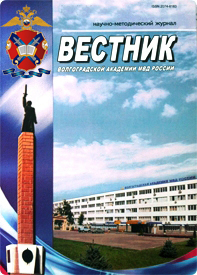The vocational training of employees for law enforcement agencies and special services which is carried out on the basis of the educational organizations of the Russian Federation is highly appreciated by the partner countries within the Collective Security Treaty Organization. It confirms a demand and relevance of this direction and strengthens positions of the Russia on international level. Needs for training of employees in various directions grow. The number of the countries which wish to direct the representatives on preparation in the educational organizations of the Russian Federation increases. One of actual problems of legal regulation of training of the foreign military personnel in the educational organizations of the Russian Federation is uncertainty of legal status of directly foreign military personnel that it is expedient to fix in total regulations of the international and federal level, and also in the subordinate regulations regulating these questions. The concept of legal status of the foreign serviceman having training in the educational organizations of the Russian Federation should be formulated taking into account the conceptual approaches which developed in the theory of the right and branches of jurisprudence at determination of legal status and a legal status of the personality in general.
legal status, foreign military, training, educational institution
1. Voevodin L. D. Yuridicheskiy status lichnosti v Rossii. M.: INFRA-M-NORMA, 1997.
2. Baranenkov V. V. Yuridicheskaya lichnost' voennyh organizaciy: monogr. M., 2008.
3. Protasov V. N. Teoriya prava i gosudarstva. Problemy teorii prava i gosudarstva. 2-e izd., pererab. i dop. M., 2001.
4. Kuchinskiy V. A. Lichnost', svoboda, pravo. M.: Yurid. lit., 1978.
5. Vitruk N. V. Osnovy teorii pravovogo polozheniya lichnosti v socialisticheskom obschestve. M.: Yurid. lit., 1979.
6. Obschaya teoriya prav cheloveka / pod red. E. A. Lukasheva. M., 1996.
7. Zagidulin R. A. Ponyatie pravovogo polozheniya Vooruzhennyh Sil Rossiyskoy Federacii // Materialy nauchno-prakticheskoy konferencii. M.: VU, 2009.
8. Sorokina Yu. V. Gosudarstvo i pravo: filosofskie problemy: kurs lekciy. M., 2004.
9. Koryakin V. M. Teoretiko-pravovye osnovy statusa veterana v Rossiyskoy Federacii // Ros. voen.-pravovoy sb. 2007. № 9. URL: voenprav.ru (data obrascheniya: 01.07.2015).
10. Vasil'chenko Yu. V. Special'nyy status inostrannogo grazhdanina: ponyatie, specifika v obrazovatel'nyh organizaciyah pogranichnogo profilya // Simbioz nacional'nogo i mezhdunarodnogo prava: sb. publikaciy fonda razvitiya yuridicheskih nauk. SPb., 2015.
11. Tkacheva N. A. Garantii realizacii instituta osnov konstitucionnogo stroya: ponyatie, naznachenie, vidy, real'nost'. URL: http://www.superinf.ru (data obrascheniya: 01.07.2015).
12. Ob obrazovanii v Rossiyskoy Federacii: feder. zakon ot 29 dekabrya 2012 g. № 273-FZ: prinyat Gos. Dumoy 21 dekabrya 2012 g., odobr. Sovetom Federacii Feder. Sobr. Ros. Federacii 26 dekabrya 2012 g., s izm. po sost. na 30 dekabrya 2015 g. // SZ RF. 2012. № 53. St. 7598.
13. Alekseeva A. P. Deyatel'nost' rossiyskoy policii v ocenkah obschestvennosti // Vestnik Volgogradskoy akademii MVD Rossii. 2011. № 4. S. 26-33.
14. Alekseeva A. P. [i dr.]. Monitoring obschestvennogo mneniya kak sposob ocenki deyatel'nosti rossiyskoy policii // Vestnik Volgogradskoy akademii MVD Rossii. 2015. № 4 (35). S. 50-57.









